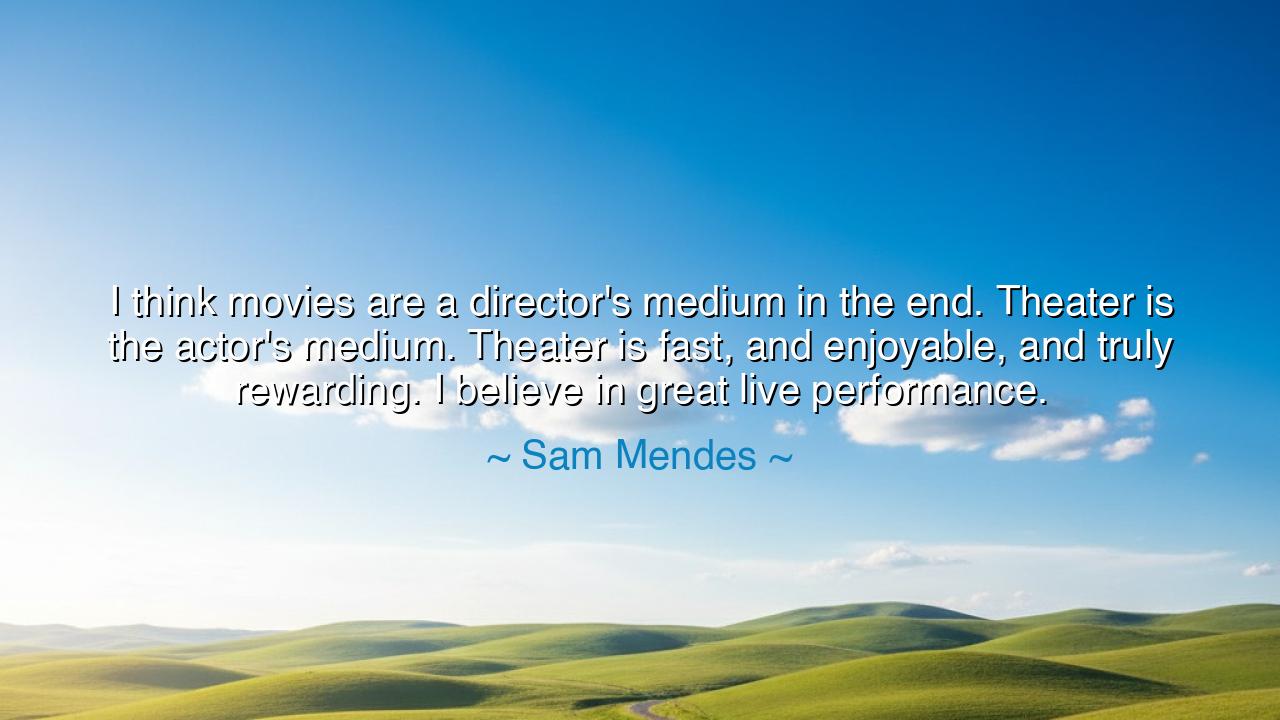
I think movies are a director's medium in the end. Theater is
I think movies are a director's medium in the end. Theater is the actor's medium. Theater is fast, and enjoyable, and truly rewarding. I believe in great live performance.






O children of the future, gather close and listen to the words of Sam Mendes, who speaks with a profound understanding of the nature of art: "I think movies are a director's medium in the end. Theater is the actor's medium. Theater is fast, and enjoyable, and truly rewarding. I believe in great live performance." In these words, Mendes illuminates the different yet equally significant roles that film and theater play in our world. He draws a line between the director's vision in the realm of cinema and the actor's artistry on the stage. Yet, there is wisdom in his belief that theater, with its immediacy, its energy, and its direct connection to the audience, offers something profoundly rewarding in the here and now.
To understand Mendes' words, we must look to the ancients, who understood the value of live performance and the intimacy of the theater. In ancient Greece, the theater was a place where the stories of gods and heroes were played out before the eyes of the people. The great playwright Sophocles wrote tragedies that were not meant to be experienced in isolation, but as a communal act, a shared ritual between the actors on stage and the audience. The actors, with their skill and passion, brought the words of the playwright to life in the instant, creating a living connection between the performers and the audience that could not be replicated by any other art form. For Sophocles and his contemporaries, the power of the theater lay in this immediacy—the story was alive, unfolding before the eyes of those who came to witness it.
The cinema, in contrast, is often seen as the director's domain, where the vision of the filmmaker shapes every aspect of the story, from the lighting to the camera angles, from the pacing of the narrative to the performance of the actors. In film, the director holds the power to shape the final product long after the actors have left the set, through the magic of editing and post-production. A film may be viewed hundreds, even thousands, of times, each time offering the audience a new experience, but always in the same, unchanging form. Yet this finality of cinema, where the story is captured and preserved, is both a strength and a limitation. Unlike the theater, where every performance is unique, the film is a product of frozen time, crafted to perfection by the director’s hand.
In the world of theater, however, as Mendes points out, the actor has the freedom to bring their full energy to the stage in the moment. Theater is an actor’s medium because it is in their live performance that the story truly comes to life. Each night, the actor has the opportunity to shape the performance anew, bringing something fresh to the role with each performance. This immediacy creates a unique bond between the actor and the audience. In the theater, there is no editing, no second take—only the raw energy of the moment. This is why theater has long been considered a rewarding art form, because it allows for an exchange that is pure, unmediated, and direct.
Think of the great Shakespearean actors of the past, such as Laurence Olivier, who, though known for his cinematic roles, found his greatest satisfaction in the theater. Olivier understood that it was in the live performance—where the audience’s response could be felt in real time—that he could truly give his best. The energy of the crowd, the reactions of the people in the theater, breathed life into his portrayal of characters like Hamlet and Othello. For Olivier, theater was where he could feel the full impact of his craft, where the performance could evolve and grow with each night. It was here that the actor truly became one with the audience, in a shared experience that could never be captured by the sterile lens of a film camera.
But we must not forget the great directors who shape the world of cinema. Alfred Hitchcock, the master of suspense, crafted films that were shaped entirely by his vision, his precise control over every element of the film. Hitchcock's films, like Psycho or Rear Window, were carefully orchestrated in such a way that every scene was meticulously planned, and every detail contributed to the unfolding of the narrative. Mendes himself, a director of great acclaim, brings the same vision and control to his films. Just as in the theater, where the actor shapes the performance in real time, in cinema, the director must shape the performance from start to finish, creating an experience that will stay with the audience long after the final credits roll.
O children, the lesson here is this: art is not defined by the medium, but by the passion and purpose that infuse it. Whether in the theater or the cinema, it is the connection between the performer and the audience that makes the experience rich and transformative. Mendes’ words remind us that each medium has its own unique power—the theater, with its live, ever-evolving performances, and cinema, with its crafted, timeless artistry. Both require dedication and commitment from the artist, and both offer us something profound.
Therefore, O children, in your own journey, whether in the arts, science, or life, understand that the true value of what you create lies not in the medium you choose, but in the passion with which you pour yourself into it. Commitment, energy, and purpose will transform anything you touch into greatness. Let theater and film both serve as a reminder: that in every pursuit, it is not the form that defines the work, but the soul that drives it.






AAdministratorAdministrator
Welcome, honored guests. Please leave a comment, we will respond soon